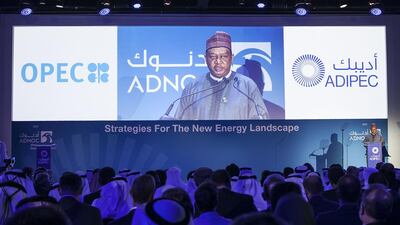Russia will join an output-curbing deal between Opec and non-Opec producers to help speed up the rebalancing of the oil market, the secretary general of the oil group, Mohammad Barkindo, said on Monday.
Opec members and some key oil producers from outside the group, especially Russia, have been in talks since September, when they agreed in principle to limit production to speed a recovery in oil prices, which have shown only a tentative improvement this year.
“I have heard from the highest quarters in Moscow that Russia is on board,” said Mr Barkindo, on his way to the opening discussion at this year’s Abu Dhabi International Petroleum Exhibition and Conference (Adipec).
Also present for the opening speeches were Sultan Al Jaber, Minister of State and head of the Abu Dhabi National Oil Company, who is also chairman of the conference, and the chief executive of ExxonMobil, Rex Tillerson.
The possibility of an output deal is dominating oil industry discussions ahead of a scheduled ministerial meeting at Opec headquarters in Vienna on November 30.
When asked what kind of terms he expected Russia to sign up for, Mr Barkindo said: “I cannot go into those details at the moment. These will be for discussions of the technical committee that is due to reconvene on November 25 and 28 with the Russians.”
Russian officials have given mixed signals on whether they will join output cuts since talks emerged in September. Opec may be once bitten twice shy when it comes to Russia, after it reneged on a 2001 agreement to cut production, only to raise exports instead.
“We believe it is vital that both Opec and non-Opec come together and take coordinated and timely action to rebalance this market for the common good for all,” Mr Barkindo said at the conference.
Although Mr Barkindo said he did not see any stumbling blocks for a deal, several members of Opec have made it clear that they expect special treatment because of their circumstances. These include Iran, which is still raising production after nuclear-related sanctions were removed this year; Libya, which has had erratic production while it has dealt with a civil war; Iraq, which is also dealing with a war against ISIL militants; Nigeria, which has had production cut by sabotage from activists in its southern states; and Venezuela, whose industry has been in decline for years under the governments of the late Hugo Chavez and Nicolas Maduro.
Against this backdrop, Opec, which is de facto led by Saudi Arabia, has been looking to Arabian Gulf producers, including Kuwait, the UAE and Qatar, to provide the bulk of the output curbs, although they are the lowest-cost producers in the world. The talks are focused on stitching together a deal that would at least have the semblance of shared sacrifice.
Meanwhile, different views on where the market is heading were given by speakers at Adipec.
Suhail Al Mazrouei, the Minister of Energy, said the oil glut has all but disappeared.
“The glut is almost gone from where it was a year ago, and this is a positive thing for us to think about,” the minister said. “I think we are at the bottom of the cycle.”
Mr Tillerson, however, pointed to the continued presence of the glut, which is exacerbated by an economic slowdown and low energy demand.
“Evidence shows the global oil and gas market supply has exceeded demand by an average of somewhere between 1 and 2 million barrels a day since the beginning of last year,” Mr Tillerson said.
Despite this excess, global demand is expected to rise as populations expand and economic growth accelerates over the next few decades.
“According to ExxonMobil’s own outlook for energy, our long-range supply-demand forecast, global economic output will more than double by the year 2040,” Mr Tillerson said. “Even after factoring in impressive energy efficiency, we expect global energy demand will grow by around 25 per cent [by 2040].”
Bob Dudley, the chief executive of BP, said he does not expect international oil companies to increase their spending next year as oil prices remain under pressure.
When asked whether he expected capital expenditure to rise next year, he said: “No, I don’t. I think we’re going to be about the same level next year as we have seen it this year. We’re bolting it down and we’ve seen a lot of cost savings coming through and industry deflation.”
amcauley@thenational.ae
dalsaadi@thenational.ae
Follow The National's Business section on Twitter
__________________________________
ABU DHABI OIL, Adipec 2016: The National's full coverage
■ Central bank policies may be a roadblock to oil investment, says Yergin
■ Saudi market grows in importance for ABB
■ Abu Dhabi to step up petchems output
■ IT improvements in the oil industry could save billions
■ Recovery use shows solar works with oil
__________________________________

